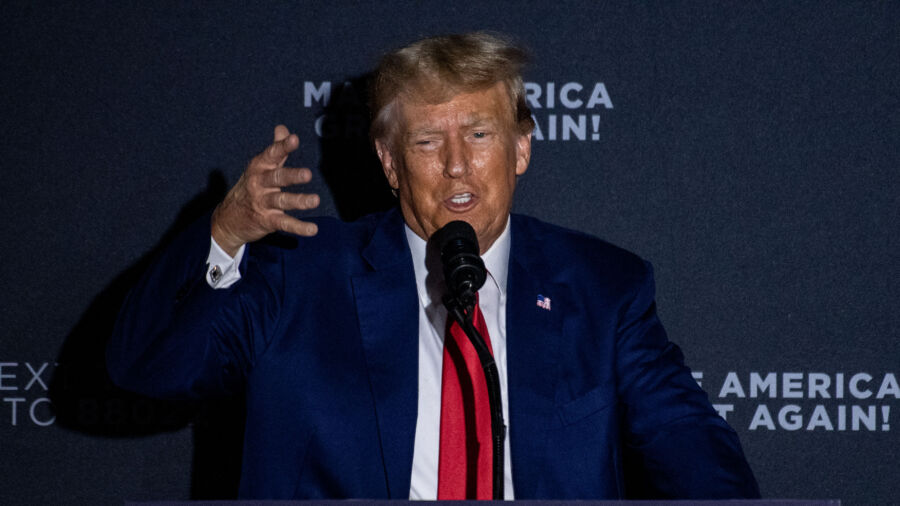X, previously known as Twitter, provided data and records related to the Twitter account of former President Donald Trump to special counsel Jack Smith in response to a secret search warrant.
Mr. Smith obtained the warrant in January as part of an investigation into President Trump’s effort to reverse the results of the 2020 election. He’s since brought four charges against the former president, including a conspiracy to “impair, obstruct, and defeat” the collection and counting of electoral votes; conspiracy against Americans’ right to vote; obstruction of the electoral vote counting by Congress; and conspiracy to obstruct the electoral vote counting (pdf).
The existence of the warrant was revealed in a sealed July 18 decision by the District of Columbia federal appeals court. The court reissued the decision and released it publicly on Aug. 9 with sealed information removed (pdf).
As the document details, Twitter initially didn’t comply with the warrant and, after missing the deadline by four days, informed the special counsel that it wouldn’t comply and instead challenge in court a nondisclosure order that required the company to keep the warrant secret, even from President Trump, for 180 days.
Twitter did file its challenge in the D.C. federal district court on Feb. 2, while Mr. Smith moved to have Twitter held in contempt for non-compliance.
Twitter argued that the non-disclosure order impermissibly violated its First Amendment right to communicate with its users, President Trump in this case.
The court sided with Mr. Smith in the argument that Twitter still needed to comply with the warrant even while challenging the non-disclosure order. On Feb. 7, the court conditionally held Twitter in contempt, giving the company several hours to comply to avoid sanctions.
The lawyer representing Twitter affirmed the deadline and didn’t object to an unusual sanctions regime proposed by the prosecutors—a daily fine that would start at $50,000 and would double each additional day. At such a pace, the fine would reach over $6 million in a week, more than $800 million in two weeks, upwards of $100 billion in three weeks, and exceed the world’s gross domestic product in a month.
X wasn’t able to provide all the data by the deadline and ended up taking some 50 hours to comply completely, getting slapped with a $350,000 fine. It appealed the ruling to the D.C. circuit appeals court, which affirmed the fine on July 18.
The court ruled that the prosecutors had the right to curtail Twitter’s right because they had an “unquestionably compelling” interest in pursuing their investigation of President Trump and keeping it secret from him and also because the order was “narrowly tailored,” such as by limiting its duration to 180 days.
X didn’t immediately respond to a request for comment.
On June 20, the prosecutors filed a motion to extend and limit the non-disclosure order so as to allow Twitter to disclose it to President Trump, but still “withhold the identity of the case agent assigned to the investigation.”
Twitter was taken over by billionaire Elon Musk, founder of SpaceX and Tesla, in October. Musk brought to the company greater emphasis on free speech.
“If you were unfairly treated by your employer due to posting or liking something on this platform, we will fund your legal bill. No limit. Please let us know,” Mr. Musk announced on X on Aug. 5.
The charges against President Trump rest on the premise that he didn’t really believe his own claims that the victory in the 2020 election was illegally taken from him.
In some of the latest developments, President Trump’s lawyers criticized the judge presiding over the case for denying them more time to respond to Mr. Smith’s request for a gag order. District Judge Tanya Chutkan gave them three days to respond, including the weekend, when the regular rule in D.C. courts is 14 days.
“Without doubt, the Court’s decision to vary from the default Local Rules and allow President Trump less than one business day to respond to this important Motion is a concerning development, inconsistent with his due process rights,” the lawyers said in a court filing, asking the judge to provide the regular 14 days in the future.
Subsequently, President Trump asked for a few days’ delay in scheduling a hearing on the gag order. The judge didn’t accommodate the request.
The lawyers have argued the gag order proposed by Mr. Smith is too broad as it would bar the former president from discussing evidence provided to his defense by the prosecutors. Instead, they propose a protective order that would only cover information labeled by the prosecutors as “sensitive.”
President Trump also faces charges, brought by Mr. Smith in Florida, of illegal retention of national defense information, obstruction, and lying. Another slew of charges, for alleged falsifying of business records, was brought by a New York state prosecutor in Manhattan. President Trump has pleaded not guilty to all of the charges. Yet more charges are expected to come from a district attorney in Georgia, also related to Trump’s efforts to challenge the 2020 election.
From The Epoch Times


